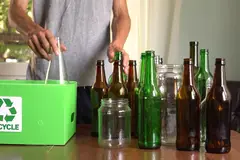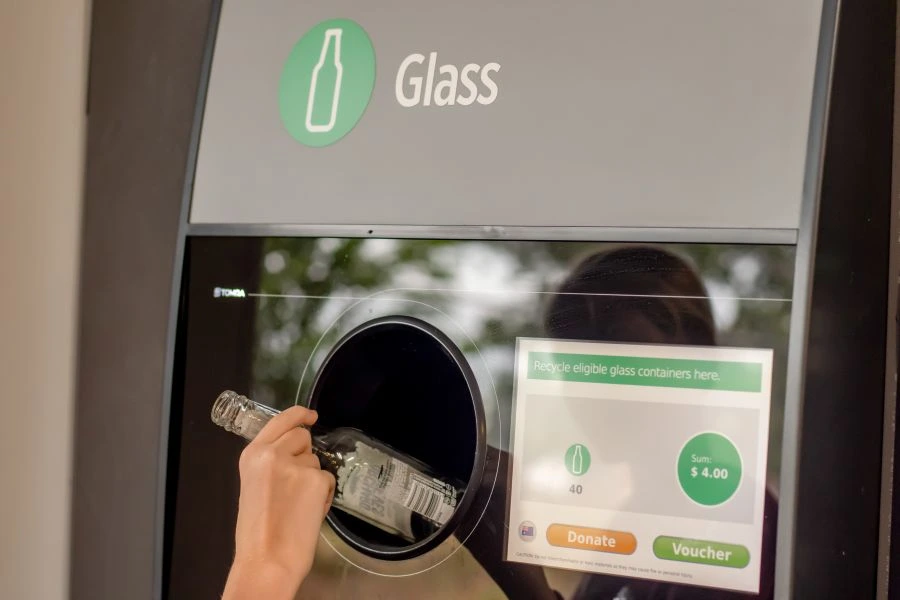German trade association calls for higher glass bottle deposit as industry remains divided
Key takeaways
- The VKU calls for a higher glass bottle deposit to reduce littering, while the VDM defends the current system’s success.
- The VKU argues the increase would preserve purchasing power, but the VDM cites 98–99% return rates.
- Industry groups oppose the increase, citing legal, financial risks and the effectiveness of existing systems.

The Association of Municipal Enterprises (VKU), a German trade association for waste management, has called for a higher deposit on glass bottles to reduce littering. However, industry players, such as the German Mineral Water Association (VDM), disagree with the VKU’s call, stating that Germany’s current glass collection and reuse system is already successful and “world-leading.”
Speaking with Packaging Insights, a spokesperson from the VKU argues that a deposit increase would preserve its purchasing power and reduce environmental pollution.
The spokesperson argues that the VKU isn’t calling for a “real” increase but a “nominal adjustment” to maintain the deposit’s purchasing power. “Rejecting this means accepting a de facto loss in its effectiveness.”
“The deposit hasn’t changed in over 20 years. Inflation has eroded its value, weakening its incentive effect,” adds the spokesperson.

Glass deposit debate
However, the VDM, among others, argues against an increase in glass bottle deposits, stating that the VKU has no official position or data to back up its claims. Moreover, it states that the current discussion is not fueled by a concern for littering but by the recent deposit raise in Austria.
Jürgen Reichle, managing director at the VDM, argues that the environmental impact of glass bottle littering is “well resolved,” given that nearly 100% of bottles are returned.
He adds: “The current ‘discussion’ on the deposit is based on one article published by the German press agency dpa, covered by many German papers, in which VKU is cited to propose a higher deposit.”
“We are not aware if this is an official position by VKU, nor have we received requests by VKU on raised littering due to beverage bottles in public.”
The deposit for reusable glass bottles in Germany is €0.8 (US$0.94), a value agreed on by the beverage industry, while single-use plastic bottle deposits are determined by national legislation.
Pollution vs. recycling success
The VKU stresses that glass bottles are increasingly left in public spaces.In many German cities, glass bottles are left in public spaces rather than taken back to return points.
The VKU argues that a stronger incentive is key to curbing glass bottle pollution, rather than expanding collection, increasing awareness, or other recycling measures.
“Our impression is that more refillable bottles are being left behind in public spaces,
especially those with low deposit values,” says the spokesperson.
The VDM’s Reichle highlights that, based on data from the German Federal Environmental Agency, the return rate for all beverages is between 98% and 99%.
He adds: “Therefore, we do not share the scenario of increasing littering and pollution. Germany operates world-leading reusable and circular systems for beverage packaging, of which the bottles used by German mineral water companies are an integral part.”
Many industry stakeholders, such as the German Brewers Association and the Federal Association of German Beverage Wholesalers, oppose the increase.
The VKU spokesperson argues there is no disadvantage of a higher deposit for low-income groups. “The deposit is refundable, so it doesn’t create a financial burden. The deposit on single-use bottles is already higher and hasn’t proven to be a barrier.”
Lack of data
The VDM has accused the VKU of not providing sufficient data to suggest increased rates of glass bottle littering.
Reichle adds: “Neither VKU nor anybody else has provided data on an alleged increase of pollution through littering by reusable bottles.”
“A joint project of the German beverage industry two years ago showed that increasing the deposit amount would entail legal, accounting, and financial risks for companies that significantly outweigh any potential benefits.”
“This is why the industry is not following the suggestions from a very few companies to raise the deposit.”
He adds that the discussion surrounding a deposit increase was “in part” fueled by a deposit increase in Austria. But Reichle stresses: “The difference between Germany and Austria is that the latter did not have the high return rates we have in Germany.”
Glass’s beverage packaging supremacy
 Despite the VKU's concern, the VDM highlights that return rates for all beverages is between 98% and 99%.Glass is often lauded as one of the most sustainable materials. Glassmaker Bormioli Luigi recently highlighted its infinitely recycled nature.
Despite the VKU's concern, the VDM highlights that return rates for all beverages is between 98% and 99%.Glass is often lauded as one of the most sustainable materials. Glassmaker Bormioli Luigi recently highlighted its infinitely recycled nature.
The VKU spokesperson says: “Refillable glass is one of the most sustainable options. A higher deposit supports its return system and helps it compete fairly with single-use packaging.”
They also add that the VKU actively engages with its member companies — municipal waste management and city cleaning services — to ensure that any “deposit increase leads to less litter and better recycling.”
Meanwhile, Reichle notes the success of glass as a reusable material. “Mineral water bottles already achieve a very high return rate of nearly 100% and thus do not contribute to a supposed increase in glass waste.”
He stresses that the VDM’s focus is on maintaining the efficiency of an “already highly successful system.”
“The high return rates of reusable containers in our sector confirm that the existing reusable and circular system functions excellently and already makes a highly relevant contribution to sustainability.”
Reichle shares that the VDM aims to share its knowledge with other countries that want to establish or optimize beverage reuse and return systems.
Germany’s DRS recently came under criticism when the “Verband Sozialer Wettbewerb” (VSW), the German trade association that monitors industry compliance, sued The Duke, a Munich gin distillery, for breaking the country’s DRS rules for non-alcoholic beverages.












